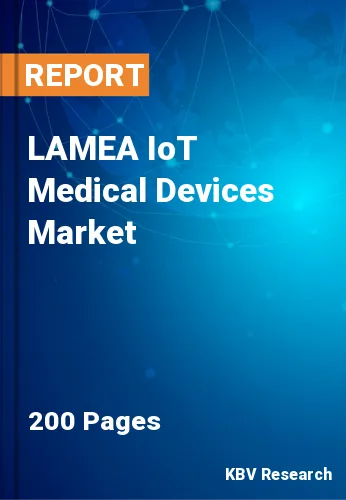
The Latin America, Middle East and Africa IoT Medical Devices Market would witness market growth of 31.9% CAGR during the forecast period (2023-2030).
IoT devices can engage patients in their own healthcare by providing them with access to their health data. This encourages patients to take a more active role in managing their health and adhering to treatment plans. The data collected from IoT medical devices can be analysed to identify trends, predict disease outbreaks, and optimize healthcare resource allocation. This can aid in population health management and epidemiological research.
The demand for cost-effective healthcare delivery, increased government measures to promote digital health, and greater attention to active patient involvement and patient-centric care delivery have all contributed to the robust growth of the market. These elements have paved the way for better healthcare services and improved patient outcomes while encouraging innovation in IoT medical devices.
The UAE has made significant advancements in digital healthcare. The country's high smartphone adoption rate and technologically knowledgeable population make it an ideal location for digital healthcare solutions. The UAE healthcare sector offers a variety of digital healthcare solutions, including telemedicine, virtual consultations, digital health records, and remote patient monitoring. These solutions have the potential to revolutionize the UAE's healthcare sector by increasing patient access to healthcare services, increasing the quality of care, and lowering healthcare costs. The region's digital healthcare developments are expected to boost the demand for IoT medical devices in the coming years.
The Brazil market dominated the LAMEA IoT Medical Devices Market by Country in 2022 and would continue to be a dominant market till 2030; thereby, achieving a market value of $4,402.9 million by 2030. The Argentina market is showcasing a CAGR of 32.6% during (2023 - 2030). Additionally, The UAE market would register a CAGR of 31.6% during (2023 - 2030).
Based on Product, the market is segmented into Vital Sign Monitoring System (ECG/Heart Rate Monitor, Blood Pressure Monitor, Blood Glucose Monitor, Oximeters, and Others), Hearing Devices, Imaging Systems, Implantable Cardiac Monitors, Patient Monitors, Respiratory Devices, Infusion Pumps, Ventilators, Anesthesia Machines, and Others. Based on Connectivity Technology, the market is segmented into WiFi, Bluetooth, and Zigbee & Others. Based on Type, the market is segmented into Stationary Medical Devices, Wearable Medical Devices, Implantable Medical Devices, and Others. Based on End User, the market is segmented into Hospitals & Clinics, Nursing homes, assisted living facilities, long-term care centers & home care settings, and Others. Based on countries, the market is segmented into Brazil, Argentina, UAE, Saudi Arabia, South Africa, Nigeria, and Rest of LAMEA.
Free Valuable Insights: The Worldwide IoT Medical Devices Market is Projected to reach USD 251.9 Billion by 2030, at a CAGR of 29.5%
The market research report covers the analysis of key stakeholders of the market. Key companies profiled in the report include Medtronic PLC, GE HealthCare Technologies, Inc., Koninklijke Philips N.V., Abbott Laboratories, Boston Scientific Corporation, Omron Corporation, Baxter International, Inc. (Hill-Rom Holdings, Inc.), Johnson & Johnson, Nihon Kohden Corporation and Siemens Healthineers AG (Siemens AG).
By Product
By Connectivity Technology
By Type
By End User
By Country
Our team of dedicated experts can provide you with attractive expansion opportunities for your business.
